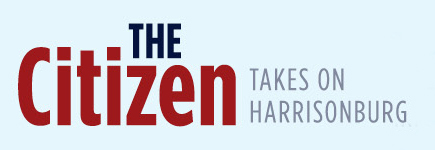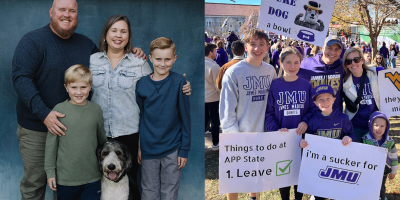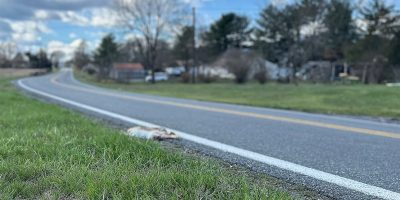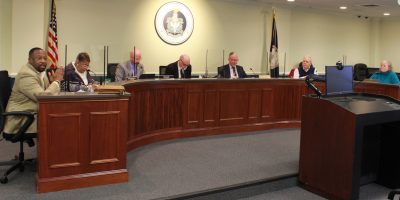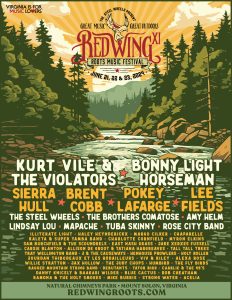
By Randi B. Hagi, assistant editor
Water and sewer infrastructure. Traffic studies. Public education. Special use permits. It’s that kind of nonpartisan work that requires constant attention from local elected officials.
But occasionally, partisan division breaks through the everyday congeniality, like when the Harrisonburg city council discussed a resolution proposed by the city’s Republican Party in favor of establishing a “Second Amendment sanctuary.” Tensions flared. Voices got louder. It was anything but business-as-usual in the council chambers.
It was also a reminder that even local officials who are far removed from multi-million-dollar presidential campaigns or Washington’s hot-button issues du jour can’t escape the type of debates that fuel national politics.
At that meeting in January, more than a dozen proponents of the resolution started a shouting match with the council, quieting only after Mayor Deanna Reed said they could “be excused” if they wouldn’t respect the council proceedings.
Independent council member George Hirschmann had asked for the discussion to be included in that meeting’s agenda. The other four on council are Democrats.
Hirschmann said he received negative feedback from local residents after the meeting.
“One of the things I got in trouble for was presenting the Second Amendment sanctuary,” Hirschmann told The Citizen. “I believe they have a right to make a statement.”
Reed said “you could clearly see the divide” in public opinion at that meeting.
Vice Mayor Sal Romero said he valued having that discourse in a council meeting, despite the tension.
“It was good to be able to have that. I’m sure that there were lots of people who were not satisfied with the outcome of it,” Romero said. “But again, I think that we are all very committed to doing everything that we can to support and to represent our constituents locally.”
Where the council members differ, though, is how they see the divisive tenor of the national political discourse affecting the day-to-day of local policy making.
So The Citizen sat down with each of them individually to interview them about what comes along with being a public official in a hyperpartisan climate — including the emotional toll it takes, the challenges it poses to conducting the city’s business and the overall interpersonal dynamics of representing the Friendly City.

Fixing potholes isn’t a Democratic or Republican issue
Council member Chris Jones said he sees local groups on both the far-left and far-right as louder than a moderate majority.
“Sometimes the noise and the volume from those in the extremes can dominate … how sensible most people are on the left and the right,” Jones said. “It’s my job to listen to the sensible majority and not be rattled by those that live in the extremes.”
To hear from those in the middle, Jones must seek them out. One way he does this is by hosting lunchtime conversations before council meetings, when community members can come speak with him about any city issue.
Through outreach, Jones said he sees local residents rising above the squabbling of national politics.
“I think the greater populace of Democrats and Republicans in Harrisonburg share very similar perspectives and values in general,” he said.
In a similar vein, council member Richard Baugh jokes, “Which is the Democratic or Republican position on fixing this pothole out here?”
The majority of what council deals with, he said, comprises making decisions about mandated services.
Reed said that while some issues draw out partisan conflict, such as the Second Amendment sanctuary resolution, local residents across the political spectrum are generally cooperative.
“I do not see it being as divisive,” she said. “I just don’t think that’s who we are as Harrisonburg.”
Romero agreed, saying he believed the council and general public all care about the community, and are able to work together comfortably to maintain and improve it. Plus, Harrisonburg is small enough that you develop personal relationships with people with whom you disagree.
“You get to know the person better, which helps understand the politician,” Romero said.
Hirschmann, however, said he feels a degree of isolation, being the only right-leaning council member.
“There’s a blue area of the city and the red area, and they remain quite separate. I notice that very much on council,” Hirschmann said.
He said he feels as if his vote isn’t needed if the four Democrats stick together on a certain issue – although he acknowledged that the council usually votes unanimously.
Hirschmann has yet to decide if he’ll run for reelection this year. But if he does, he’ll have to decide whether to run as an independent again or throw his hat in the ring as a Republican.
As a newcomer to local politics, Hirschmann said he originally wanted to “walk down the middle of the aisle.”
But as time has passed, “I find my thinking is much more to the red side than the blue,” he said.
The course toward mutual respect
All five council members expressed their gratitude for public input. Baugh, the longest-sitting council member who was first elected in 2008, said it hasn’t always been that way.
The council, as an institution, has had to cultivate mutual respect with citizens, he said. The turning point, Baugh said, was an event that roils public opinion to this day: the creation of the Heritage Oaks Golf Course.
In 2000, while the golf course project was in the works, the community elected a “transpartisan three-person ticket to stop golf course construction,” as former council member Kai Degner wrote.

It was a rout of the existing council, as several members of what Baugh called the “old guard” were ousted.
Aside from rancor over the course itself, Baugh said, was dissatisfaction over the way in which the project had proceeded and how the council sometimes dealt with dissent.
The council at the turn of the millenium “made a lot of good decisions in a lot of areas, but you know what they weren’t real good at? They weren’t real good at treating people who disagreed with them with even a modicum of respect,” Baugh said.
And locals got fed up with elected officials who wouldn’t at least entertain their concerns – which led to refrains like, “I know you guys aren’t going to listen to me, and I know this is a done deal” during the public comment section of council meetings.
Ultimately, the golf course opened in 2001 because too much work already had been done by the time the anti-golf course contingent were sworn in.
The debate lives on even today. Jones has been a vocal opponent of the course, which has cost the city an average of about $440,000 per year over the last decade, and Jones has several times raised the prospect of selling it.
Baugh said he still hears some echoes of public disdain over previous councils’ handling of concerns, but he said those complaints are dying out as people feel more confident that their voices will be heard.
“We want citizen participation. That helps us make better decisions,” Baugh said.
‘Very much an emotional thing’
All five council members said that, to some degree, making decisions carries an emotional weight.
“Because I love and care about the people I serve. It is very much an emotional thing, because we are dealing with lives, we’re dealing with futures,” Jones said. “I look at myself as a representative and not an authority.”
Some council members said negative feedback from the public can take its toll, as well.
“As elected officials, we are here to make decisions that may, to some, be not well received. And that can be emotionally draining at times because you do want to make sure that you’re making the best decisions for the city,” Reed said. She said she values input from all sides of an issue to help the council make well-informed, logical decisions.
Romero agreed. “For me, it does have that sort of emotional toll, because it’s not just that I want to vote in a way that makes people happy, but I essentially want to place my decision making on what I think is intentionally going to be the best for the city.”
Hirschmann said while the public is generally friendly, he sometimes he gets flak for his conservative stances.
“I’m learning to take it as part of the job,” Hirschmann said. “But you stop and you think, boy, I just can’t imagine what Trump’s gone through! And then I want to sit here and complain, and I don’t have any reason to complain.”
Romero is the first Latino elected to Harrisonburg’s city council. And he made it there on a big wave of support – winning the most votes of any candidate in the 2018 council race.
He said he wants to make sure, however, that he isn’t only remembered as the first. Romero said he hopes he is remembered as someone who “voted in a way that was in alignment with his values, in what he thought was best for the city.”
In a city where an estimated 20 percent of the population is Latino, and 17 percent is foreign-born, Romero represents the interests of a huge swath of people.
“Any time there is an issue specific to the Latino or immigrant, more broadly, community, people will reach out to me and council members will look to me for guidance on that,” Romero said. “It’s a challenge and something that I’m ready to jump onto and assume responsibility.”
Each council member has their own constituents, priorities, and battles to fight.
Baugh said he’s naturally gravitated towards environmental and animal welfare issues. And his background as an attorney, plus his time spent on the Planning Commission, give him an analytical lens when reviewing legal and land use matters.
Jones said he hopes to increase the city’s community contributions to local nonprofits, especially given that 65 percent of the city’s residents live paycheck to paycheck, according to the United Way’s of Virginia’s 2017 ALICE Report.
“We need to help all these organizations and these wonderful nonprofits… that are willing to offset that burden,” Jones said.
Hirschmann also said homelessness and hunger are important issues in this community.
“There’s people here who are just constantly giving food, constantly helping, constantly trying to improve the housing situation, which is terrific,” Hirschmann said.
And Reed has been working with local agencies on a monthly basis since last summer to improve services to those who are homeless or at risk of losing their housing. As the program director of the youth empowerment organization On the Road Collaborative, Reed also takes students’ and children’s issues very seriously.
“For me, being able to serve my community, my hometown at this level has just been an honor for me, and the good certainly outweighs the bad,” Reed said.
Journalism is changing, and that’s why The Citizen is here. We’re independent. We’re local. We pay our contributors, and the money you give goes directly to the reporting. No overhead. No printing costs. Just facts, stories and context. Thanks for your support.

